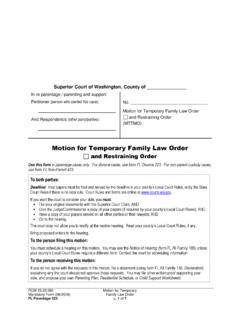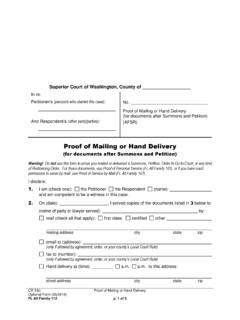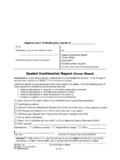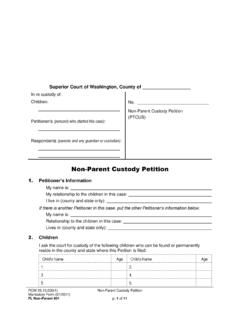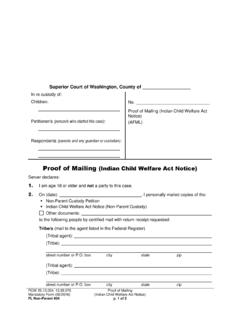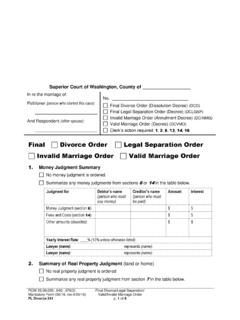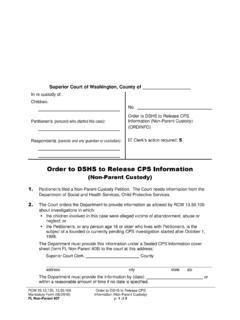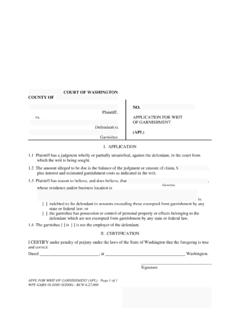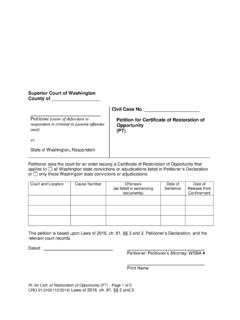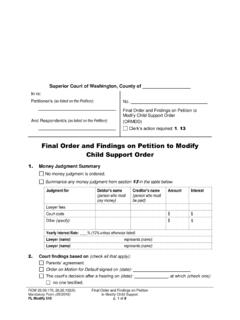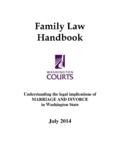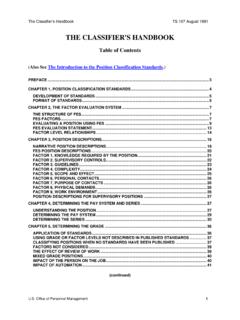Transcription of Understanding the Legal Implications of Domestic ...
1 family Law handbook Understanding the Legal Implications of Domestic PARTNERSHIPS. AND dissolution . in washington State July 2014. Table of Contents INTRODUCTION .. 1. CHAPTER 1 washington STATE-REGISTERED Domestic PARTNERSHIPS .. 2. CHAPTER 2 PRE- partnership AGREEMENTS .. 4. What is a pre- partnership agreement?.. 4. What makes the agreement enforceable? .. 4. Do you need an attorney to make these kinds of agreements? .. 4. CHAPTER 3 ENDING A Domestic partnership .. 5. How can a Domestic partnership end? .. 5. What is an annulment? .. 5. What is a Legal separation? .. 6. What is dissolution of Domestic partnership ?
2 6. Are there residency requirements for filing a dissolution action?.. 6. How does a partner file for dissolution ? .. 6. What happens after the dissolution action is filed? .. 7. When does a dissolution case end? .. 7. Is there a waiting period before a dissolution can be final? .. 8. Can partners legally change their names during a dissolution ? .. 8. Are there special court forms to use in a dissolution ? .. 8. How can an attorney help with a dissolution ? .. 8. How can courthouse facilitators help with a dissolution ? .. 8. CHAPTER 4 PROPERTY RIGHTS DIVIDING ASSETS AND 9. How does a separating couple divide property and debt?
3 9. What is community property ? .. 9. What is separate property ? .. 9. How does a court divide property and debts? .. 9. Does the court divide property and debts 50/50? .. 10. What if a partner has misbehaved during the partnership ? .. 10. What about taxes and other financial considerations? .. 10. CHAPTER 5 MAINTENANCE (ALIMONY) .. 11. What is maintenance? .. 11. How does the court decide about maintenance? .. 11. CHAPTER 6 EFFECTS OF dissolution ON CHILDREN .. 12. How does dissolution affect children? .. 12. What can parents do about the effects of dissolution and conflict on children? .. 12. CHAPTER 7 CHILDREN OF Domestic PARTNERS.
4 14. CHAPTER 8 SHARED PARENTING FOR PARENTS DISSOLVING THEIR. partnership PARENTING PLANS .. 15. What is a parenting plan? .. 15. When do parents need a parenting plan? .. 15. How does a court decide where the children will live? .. 15. What if there have been serious parenting problems? .. 15. Can children decide where they want to live? .. 16. What does a guardian ad litem do in a dissolution ? .. 16. What if there is disagreement about how to follow a parenting plan? .. 16. What about contempt of court? .. 16. How do parents change a parenting plan? .. 17. What if one of the parents is in the military? .. 17.
5 CHAPTER 9 RELOCATION OF CHILDREN .. 18. What is the Relocation Act?.. 18. How can a parent move with children? .. 18. How does the other parent object to the move? .. 18. What if the other parent does not object to the move? .. 18. What if the move is due to violence or threat of violence? .. 19. What if a parent doesn't follow the Relocation Law? .. 19. CHAPTER 10 CHILD SUPPORT .. 20. When will a court order a parent to pay child support? .. 20. What does a child support order do? .. 20. Can separating parents agree not to pay child support? .. 20. How does a court determine the child support amount? .. 20. Can child support amounts be changed later?
6 20. When does child support end? .. 21. How does a parent enforce a child support order? .. 21. Where can more information about child support be found? .. 21. CHAPTER 11 Domestic VIOLENCE .. 22. What is Domestic violence? .. 22. Is Domestic violence a crime? .. 22. How can I protect myself and/or my children from Domestic violence? .. 22. How can I get help if I am or might be an abuser? .. 22. CHAPTER 12 CHILD ABUSE AND NEGLECT .. 23. When will the state step in to protect children from harm? .. 23. What is Child Protective Services? .. 23. Are there different procedures for youth? .. 23. What about criminal penalties?
7 23. CHAPTER 13 COMMUNITY RESOURCES .. 24. Community Health Departments .. 24. DSHS .. 24. Support Groups .. 24. Legal Services .. 25. INTRODUCTION. This handbook has been developed to help you understand family law in washington State. While starting or ending a Domestic partnership may be very personal to individuals, there are laws that govern Domestic partnerships. The Legislature directed the washington State Administrative Office of the Courts to create this handbook for distribution to individuals seeking to terminate their Domestic partnership or responding to a dissolution action. The Secretary of State's Office also distributes information about Domestic partnerships to individuals entering into a state-registered Domestic partnership .
8 The handbook may help you understand the rights and responsibilities partners have to each other and any children during their partnership and after it is dissolved. Throughout this handbook , you will find answers to questions often asked about Domestic partnership , dissolution , moving with children, parentage, court orders, Domestic violence, child abuse and neglect, as well as the effects on children from separation of their parents. While this publication is not designed to provide Legal advice, it will provide general information about the partnership contract, applicable laws about property and debts, and laws about dissolution of partnerships in washington State.
9 This handbook is not intended to take the place of an attorney, who can explain laws and give advice for a specific situation. It is always a good idea to consult with an attorney about your rights and responsibilities regarding any Legal issue, including Legal Implications of Domestic partnerships. It is important to remember that this handbook discusses only family law in washington . Different laws may apply in other states. An attorney can fully explain your rights and responsibilities and how they can be affected by situations such as having lived in another state. July 2014 Edition Domestic partnership family Law handbook 1.
10 CHAPTER 1. washington STATE-REGISTERED Domestic PARTNERSHIPS. The laws that govern Domestic partnerships are found primarily in Chapter of the Revised Code of washington (RCW). You can find a copy of those laws at the washington Legislature's Web site at Throughout this handbook , the terms Domestic partnership and partnership mean state-registered Domestic partnership , and the terms Domestic partner and partner mean state-registered Domestic partner. (RCW & ) Under washington law, Domestic partnership is a civil contract between two adults who meet statutory requirements. Those requirements are: 1) both persons share a common residence; 2) both persons are at least eighteen years old and at least one person is sixty-two years of age or older; 3) neither person is married to someone other than the party to the Domestic partnership and neither person is in a Domestic partnership with another person; 4) both persons are capable of consenting to the Domestic partnership ; 5) the persons are not nearer of kin to each other than second cousins, whether of the whole or half blood computing by the rules of civil law.
